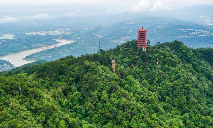China has to fight pandemic strictly

Medical workers check residents' information with a community staff member in Beicai Town of Shanghai, April 26, 2022. [Photo/Xinhua]
Many people may think that China's dynamic clearing policy to contain the COVID-19 pandemic is "unsustainable" because of the highly infectious nature of the Omicron variant of the novel coronavirus. However, it is up to every country to decide what policy it uses to contain the pandemic.
The dynamic clearing policy is a public health policy that has been implemented not only on the Chinese mainland but also to varying degrees in China's three other regions (Taiwan, and the Hong Kong and Macao special administrative regions). Regrettably, Taiwan's health authorities recently dropped the policy, and the island is now suffering the consequences, having to deal with a huge increase in local cases, even fatalities.
The crux of the matter is that according to a University of California, Los Angeles study released last month, 30 percent of the people treated for COVID-19 developed post acute sequelae of COVID-19, most commonly known as "long COVID-19", which might put a huge burden on public health systems worldwide for decades.
Even a string of foreign countries such as Australia, Singapore and the Republic of Korea had adopted zero-COVID-19 policy until recently but abruptly decided to scrap it for whatever reason, I guess mainly on perceived politico-economic grounds.
Dynamic clearing is a strict control and maximum suppression strategy to contain the pandemic that, no doubt, inconveniences citizens for a period of time but, most importantly, has proved to save lives and prevent severe cases of the potentially lethal disease.
The opposite of the dynamic clearing policy is the "living with COVID-19" approach that is certainly much less inconvenient to the public but accepts, nolens volens, the fact that some of those infected will suffer severe consequences or even die from the disease. This approach is popular in countries where individual freedoms such as the "right to travel" seem to be held in higher esteem than the collective good, which is cherished in Asian societies.
The mainland, Hong Kong, Macao and Taiwan all have to cope with specific conditions that, in my view, justify the implementation of the dynamic clearing policy. The mainland has a huge population (1.4 billion) and as a (successful) developing country is still in the process of upgrading its public health system, apart from the fact that one-fifth of its population is aged 60 or above. Hong Kong, Macao and Taiwan each have a high population density, another risk factor in tackling the nasty virus.
There is a common misconception in the West that China's dynamic clearing approach is aimed at achieving zero infections. But Liang Wannian, head of the COVID-19 response expert panel under the National Health Commission, made it clear earlier this year that "a dynamic zero-COVID strategy means not letting the pandemic spiral out of control, but actively controlling it".
And an article published by the Chinese Center for Disease Control and Prevention in January 2022 said the approach "is a transitional strategy to be adopted after a successful containment strategy, when the population immunity barrier is not yet established in the face of continued risk of foreign importation and high transmission variants". The authors underlined that "the core is to take effective and comprehensive measures to deal with localized COVID-19 cases precisely, to quickly cut off the transmission chain, and to end the epidemic in a timely manner".
As it may be, the world must continue to be on high alert against COVID-19. The pandemic is not over yet-far from it. Some local commentators have said that Macao has so far been "lucky" to have kept the virus at bay. While I do admit that "luck" (one may use the more lofty term "serendipity" instead) plays a certain role in our lives, the fact that Macao is one of just a handful of regions in the world without a single COVID-19 fatality is primarily due to the effective work of the local and central governments in dealing with the virus.
I hope that the Macao government stays vigilant but, at the same time, carefully and gradually adjusts its COVID-19 control and prevention measures to the developing pandemic situation such as by gradually allowing more foreigners without a local ID card to enter.
It's only human that we would like to travel again. I haven't been outside of Macao since late December 2019-but I feel safe here. We would like to meet family members and friends whom we haven't seen in person for well over two years. But local people's protection from the virus must continue to be the sine qua non for relaxing the COVID-19 measures. I am confident that this will remain the case.
Our economic recovery depends on the continuation of the strict COVID-19 control and prevention measures. People's health is a fundamental factor for economic progress. I am sure that no one in Macao wants the region to have to deal with a messy situation resulting from erratic policies such as in North America and Europe-over 1 million COVID-19 fatalities in the United States and more than 2.2 million in the World Health Organization's European Region. These figures are a shame for those in charge of the world's most developed economies.
The fight against COVID-19 must continue to be strict and pro-active. The ongoing struggle calls for dynamism, optimism, and realism. And more countries and regions must be ready for the next global health threat-monkeypox, which could lead to permanent disfigurement.
The author is director of the Macau Post Daily.
The views don't necessarily reflect those of China Daily.
Photos
Related Stories
- Gyms reopen as COVID-19 outbreak under control in Beijing
- Chinese mainland reports 80 new local confirmed COVID-19 cases
- 441 COVID-19 patients discharged from hospitals on Chinese mainland
- Chinese mainland reports 104 new local confirmed COVID-19 cases
- China further lowers cost of COVID-19 nucleic acid tests
Copyright © 2022 People's Daily Online. All Rights Reserved.









